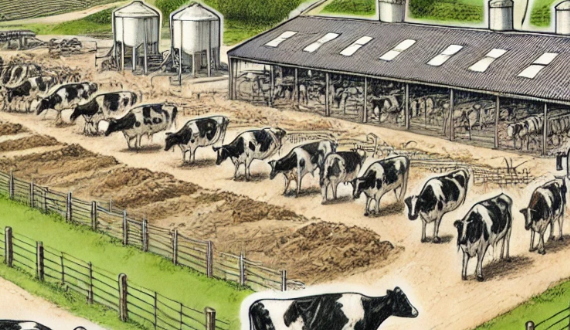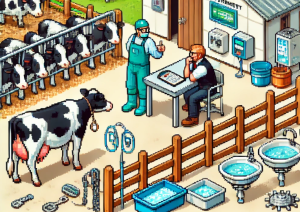
Safeguarding Farms: Essential Manure Management Practices
As the season for manure application begins in Michigan, it’s crucial to focus on biosecurity measures to prevent the spread of diseases found in manure. The recent confirmation of highly pathogenic avian influenza (HPAI) in Michigan dairy cattle has raised concerns, as the virus can be shed in milk and potentially spread through saliva, respiratory droplets, and feces. This situation underscores the importance of implementing robust biosecurity plans on farms and manure application firms to protect livestock and prevent disease outbreaks.
Importance of Biosecurity in Manure Management
Dr. Nora Wineland, the State Veterinarian, emphasizes that biosecurity is the most effective defense against HPAI. The Michigan State University (MSU) Extension experts offer several critical practices for manure management to enhance biosecurity and safeguard herds.
Pre-Application Precautions
Before applying manure, it’s essential to:
- Identify Adjacent Livestock Farms: Know the location of nearby poultry and livestock farms. Contact these farms to inform them about your manure application schedule, allowing them to adjust their biosecurity protocols accordingly.
- Plan Routes of Travel: Establish dedicated routes for manure transport and communicate with other farms using similar routes. Avoid using roadways frequented by other livestock operations when spreading infected manure.
- Engage in Open Dialogue: Maintain open communication with neighboring farms about disease status and manure application plans to ensure collective biosecurity efforts.
Practices During Manure Application
To prevent disease spread during manure application:
- Use Dedicated Equipment and Clothing: Have specific equipment and wear different clothing and boots for manure application. Utilize disposable coveralls and booties where applicable to prevent cross-contamination.
- Designate Footpaths and Vehicle Routes: Create specific pathways for employees and visitors to minimize crossover between those involved in manure application and other farm activities.
Cleaning and Disinfection Protocols
Proper cleaning and disinfection of manure application equipment are vital:
- Remove Organic Material: Before applying disinfectants, ensure all organic material is removed from equipment.
- Disinfect Thoroughly: Clean and disinfect equipment inside and out when moving between different manure sources, livestock sites, or fields. Establish tire washing and disinfecting stations at entry points to reduce the risk of spreading infectious manure.
Importance of Recordkeeping
Maintain comprehensive records of manure agitation, removal dates, locations visited, and fields where manure was applied. This documentation is crucial for tracking disease spread and identifying potential biosecurity breaches.
Commercial Manure Applicators
Commercial manure applicators should ensure they follow proper site entry protocols and maintain open communication with their contracted operations to adhere to biosecurity measures.
Yes, there are Public Health Implications!
The spread of HPAI in dairy cattle has significant public health implications, as it highlights the potential for zoonotic diseases to impact human health through agricultural practices. Implementing robust biosecurity measures is not only crucial for protecting livestock but also for preventing potential public health crises.
Biosecurity Plans and Resources
MSU Extension experts recommend dairy and beef producers revisit and tighten their biosecurity plans. Resources and example plans are available on the Secure Milk Supply and Beef Quality Assurance websites. The Michigan Manure Hauler Certification Program offers educational programs to manure applicators to prevent problems and implement effective biosecurity practices.



